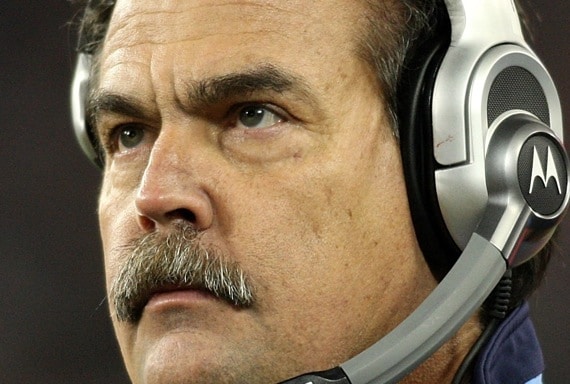As a leader, what do you do when you have an employee who disrespects you in front of your team? What do you do when this employee is a top performer and one of your supervisor’s favorites?

This is a difficult situation, to say the least, and one that almost every leader eventually finds himself confronting. These are the moments that define your leadership.
Last Sunday, the Tennessee Titans football team lost to the Washington Redskins in overtime. Vince Young, the starting quarterback for the Titans, was injured in the third quarter. Angry, he tossed his jersey and shoulder pads into the stands as he left the field.
Things got ugly in the locker room. The Tennessean reported that Young was uttering expletives under his breath, as Coach Fisher began speaking to the team. Fisher asked Young to be quiet. Then, according to the Tennessean:
Young finished dressing and started to leave. Fisher told Young to stop, saying not to ‘run out on your teammates.’
Young then told Fisher ‘I'm not running out on my teammates, I'm running out on you,” sources said. More words were exchanged, and Young left.’”
As it turns out, Young will have to have surgery on his thumb, ending the season early for him. Regardless, Coach Fisher had already determined that Young would lose his starting position to rookie Rusty Smith.
To make matters worse, Owner Bud Adams has publicly said that the two men (Fisher and Young) better find a way to get along. This puts Fisher in a difficult spot.
I’m confident Coach Fisher will figure it out. He is the NFL’s longest tenured coach. He is smart and has lots of experience. But neither Bud Adams nor Vince Young are making it easy for him.
I have been in similar situations a few times. Perhaps you have too.
You have an employee who is disrespectful—perhaps even belligerent—but he’s a top performer. Management has put up with his antics because it’s not sure the organization can win without him. You are caught in the middle. What do you do?
Here’s what I have done in the past and what I would recommend to Coach Fisher if he were to ask.
- Get clear in your own thinking. Did the employee cross the line this time or not. Is this worth putting your job on the line. In this particular example, I would say, “yes.” The integrity of Coach Fisher’s leadership and the discipline of the entire team is at stake.
- Count the cost. To confront this situation effectively, you have to be willing to put your own well-being at risk. This is a bet-your-job kind of moment. Thankfully, these don’t happen frequently, but every leader will inevitably face situations that test their resolve and courage. There is going to be a cost either way—you might as well “pick your poison.”
- Secure your supervisor’s support. You need to explain to your boss what is at stake. Be calm and reasonable. Outline how you are going to confront the errant employee. Emphasize that you are going to try to resolve the situation amicably. But if you can’t, you will terminate the employee for the good of the team. You must then ask for your supervisor’s support. Be direct. If you can’t get his support, you must resign. You can’t lead effectively in this situation.
- Confront the disrespectful employee. Assuming you have your supervisor’s support, you must sit down and calmly talk to the employee. Explain that you don’t mind disagreements. But you cannot—and will not—tolerate disrespectful behavior. There are no exceptions and no excuses. Be clear that the employee has two options: he can apologize to you and to everyone who witnessed the behavior. Or you will terminate him for cause. It’s that simple.
- Give him some time to think about it. I would further explain that you want him to take the next twenty-four hours to think about it. Affirm him. For example, “Vince, you are an enormously talented player. You are a hero to thousands of people. Everyone is watching, including your family and teammates. This is an opportunity for you to take your leadership to the next level. It is a defining moment. There is more at stake here than you may realize. I am praying that you make the right decision. I want you on the team.” I would then tell him exactly when I expect to hear from him, turn around, and walk away.
You can’t develop people and take them to the next level unless you are willing to speak into their lives—for their benefit and for the benefit of your team. This is enormously difficult but an essential part of leadership.
Disclosure of Material Connection: Some of the links in the post above are “affiliate links.” This means if you click on the link and purchase the item, we will receive an affiliate commission. Regardless, we only recommend products or services we use and believe will add value to our readers. We are disclosing this in accordance with the Federal Trade Commission’s 16 CFR, Part 255: “Guides Concerning the Use of Endorsements and Testimonials in Advertising.








